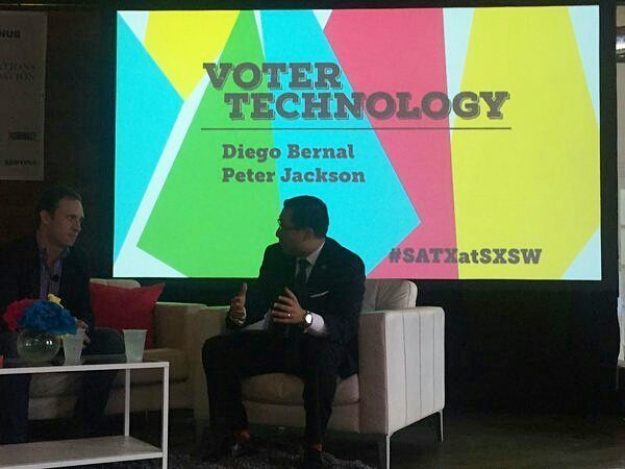Policies, not technology, present barriers to voting efficiency in state, municipal elections

AUSTIN, Texas — The antiquated system of casting paper ballots in local, state and federal elections isn’t due to a lack of technological imagination, but stems instead from policies mandating legacy processes, experts said at South by Southwest Interactive.
Diego Bernal, a member of the Texas House of Representatives, and Peter Jackson, a design and innovation consultant for Ideo, said that the technology to implement better computerized voting systems is there, but laws in states and municipalities prohibit that advancement.
Their views were reinforced by President Barack Obama, who took aim at the voting policies in Texas and other states in his keynote remarks at the conference.
“We’re the only advanced democracy in the world that makes it harder for people to vote,” Obama said. “We systematically put up barriers and make it as hard as possible for our citizens to vote.”
In Texas, and in several other states, the voting process is mandated to include a paper ballot by law, something Jackson said was antiquated, especially given the security and reliability of technology in the 21st century.
“Technology gives us that opportunity to make voting even better and a more secure experience,” Jackson said. “How can we make the experience of voting not just pleasurable, but one that really reinforces our civic responsibility?”
In Los Angeles County, California, Jackson’s company, Ideo, developed a touchscreen-enabled voting experience with accessibility options for citizens with disabilities. Voters cast their ballots on the touchscreen, and the device then prints a paper ballot that goes into an integrated ballot box incorporating the traceable paper ballot required by California law. The company expects to pilot the system in 2018, and hopefully implement it in future elections.
Los Angeles County is not the only municipality to include voting options like this; several states have digital-based voting machines.
But for Bernal, in Texas — which he said is one of the most restrictive states in terms of voting rights — until technology can be harnessed across the country to overcome legacy barriers to voting, a few states or municipalities embracing voting on computers in the polling place is not enough.
“I’ve always felt like technology can play a role in easing that path to vote,” Bernal said. “You’ve currently got a negative relationship between the citizen and the voting process, how can technology help?”
Obama called for more voting reform. In fact, during the keynote, he also called for the country to move toward voting online.
“It is much easier to order pizza or a trip than it is for you to exercise the most important task of a democracy,” Obama said. “How can we create safe, secure, smart systems for people to be able to vote much easier online?”
Contact the reporter who wrote this story at jake.williams@statescoop.com and follow him on Twitter @JakeWilliamsDC.






